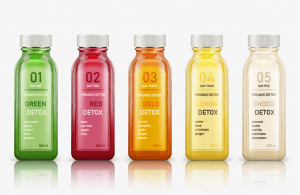 Most people associate spring with the cleaning and scouring of their house, garage, basement, or car. Some people extend the ritual to an internal cleansing of their bodies through detox diets.
Most people associate spring with the cleaning and scouring of their house, garage, basement, or car. Some people extend the ritual to an internal cleansing of their bodies through detox diets.
There are dozens of available plans for detox diets. One of the earliest, the Master Cleanse, was first introduced in the 1940s and gained popularity in 1976. It involves consuming a concoction of lemon juice, purified water, cayenne pepper, and maple syrup—and nothing else—for 10 days. Today, one of the most popular is the 10-Day Green Smoothie Cleanse, in which participants drink green smoothies and eat raw fruit and vegetables, nuts, and hard-boiled eggs. Actress and entrepreneur Gwyneth Paltrow, through her wellness company Goop, promotes detox diets that prohibit alcohol, caffeine, added sugar, gluten, dairy, soy, corn, and nightshade plants, including potatoes, tomatoes, and eggplant.
These diets often require a lot of time for shopping and preparing food. Some involve purchasing costly dietary supplements. But do they work?
There is little quality evidence on the effectiveness of detox diets for removing toxins from the body or for weight loss. But nutrition researchers have begun collecting and reviewing the available evidence.
First, a systematic review published in 2015 in the British Journal of Human Nutrition and Dietetics looked for studies on the benefits of detox diets. The authors were not able to find any randomized controlled studies evaluating detox diets. They did find one study that evaluated a program used to treat some rescue workers who were exposed to high levels of chemicals after the collapse of the World Trade Center. In the study, participants followed a detoxification protocol that included vitamin supplements, physical exercise, and spending time daily in a sauna. Many participants reported improved symptoms, but the study was small with no control group.
The review also looked at studies in animals and humans to find out if specific dietary nutrients reduced toxins in the body; they did find some evidence that specific nutrients were able to eliminate toxins. For example, one study found that consuming citric acid reduced aluminum levels in mice. Another found that selenium reduced mercury levels in birds, fish, and mammals, including humans.
The reviewers found no evidence that detox diets lead to weight loss. (More on that in a minute.)
But they did find that detox diets can be harmful. First, many detox diets don’t provide enough nutrients or calories, so they can lead to deficiencies and, in extreme cases, death. There is also the danger that people on detox diets can overdose on a specific nutrient.
A second review published in 2017 looked at the evidence on detox diets for weight loss. Again, the authors found limited evidence available, especially over the long term. There is evidence that many people lose weight during and shortly after a detox diet, most likely due to a drastic reduction in calorie intake and sometimes a loss of water and fecal weight. But there was no evidence that detox diets lead to weight loss over the long term. The authors did find a study demonstrating that strict calorie limitations led to a rise in stress hormones, including cortisol, which may stimulate a larger appetite and ultimately lead to weight gain in the long term.
The take-home message: There is a lack of scientific evidence showing that detox diets reduce toxins from the body or lead to weight loss. According to the best data available today, a healthy diet that includes restricted calories and regular physical activity is the best way to lose weight over the long term.
Visit Cornell University’s Bronfenbrenner Center for Translational Research’s website for more information on our work solving human problems.



Speak Your Mind